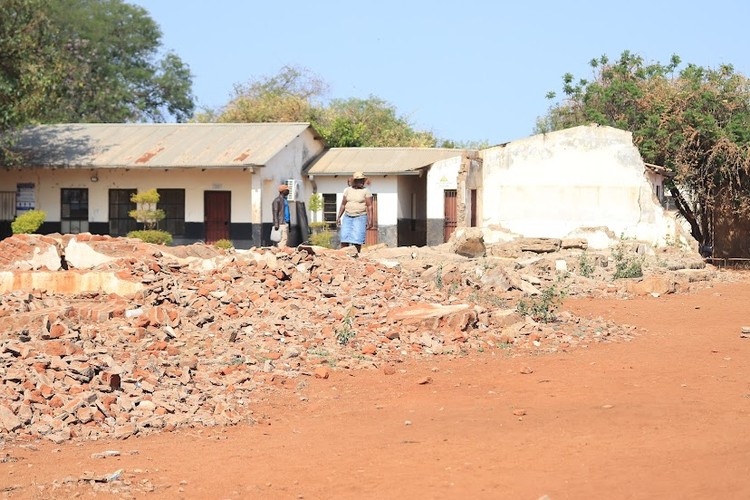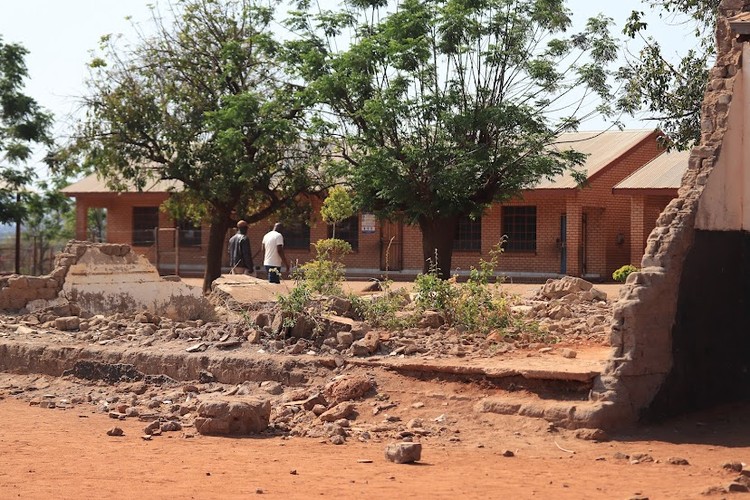Parents want the Limpopo education department to fix Maledza Primary School. Photos: Thembi Siaga
- The first classrooms in Maledza Primary School in Malamulele, Limpopo, were built in 1967 by parents.
- Classrooms have been added since by the Limpopo Department of Education but many are in poor condition.
- After years of requests by parents and teachers, the department demolished some of the old buildings in 2022.
- But the buildings have not been replaced and the rubble is still lying on the ground.
Parents of learners at Maledza Primary School in Malamulele, Limpopo, have been asking the Limpopo Department of Education since 2004 to fix their crumbling school. Now they are threatening to shut the school down in protest.
A protest planned for 21 October was called off so that learners could prepare for final exams in November, but parents and the School Governing Body (SGB) say if they must, they will close the school down to force the education department to act.
The school, which has 402 learners from Grade R to Grade 7, was built in 1967 by parents, using mud bricks for four classrooms. The education department later added further classrooms. It is the only primary school in the village, with 12 teachers and more than 400 learners, from Grade R to Grade 7.
In 2004, members of the School Management Team (SMT) and the SGB began applying to the Department of Education to build additional classrooms, as the ones being used by learners were in poor condition. Since then they have repeatedly asked the department to fix or demolish crumbling school buildings, to build a proper administration block, and new toilets.They have attached pictures and pointed out that repairs had been promised in 2010.
They have also asked for help from the Department of Public Works, and even, in desperation, from the Thulamela Municipality.
Strong winds and rain damaged eight classrooms in November 2018. The department acknowledged the damage in February 2020 and placed the school on a list for mobile classrooms, eventually providing four. But no new construction work has taken place, in spite of an assessment in 2019 after which the department recommended the construction of new classrooms and an administration block, a new nutrition centre, the drilling of a borehole, the construction of new toilets and demolition of old ones, and the provision of 15-desk classrooms for grades 4 to 7.
In March 2022, the SMT and SGB again asked the Limpopo Department of Public Works to demolish the old buildings. In June 2022 some of the buildings were demolished. But the new classrooms, hall, and additional toilets have not been built.
Currently, the school has four usable classrooms, which have termite-infested roofs. Three other classrooms are used as a computer lab, staff room, and the principal’s office. All have cracks in the walls. There are four blocks of toilets, with five toilets in each block.
When GroundUp visited, the rubble from classrooms demolished in mid-2022 had still not been cleared. Parents raised concerns that the debris poses a safety risk for learners.
“It seems our cries have fallen on deaf ears, as overcrowding and deteriorating furniture, such as desks, remain major issues,” said concerned parent Tinyiko Chauke.
A teacher who spoke to GroundUp said that Grade 4 has 69 learners in a small space.
David Mathebula, the SGB chairperson, said: “We’ve submitted multiple applications, but no action has been taken. The school is in bad condition, and even the roofs we repaired were affected by strong wind and rain in 2018,” said Mathebula.
Asked about the department’s efforts since 2004, provincial education spokesperson Mosebjane Kgaffe said that the school had been prioritised for infrastructure upgrades this financial year.
She did not explain the reasons behind the delays, saying only that school infrastructure needs are handled according to district assessments and budget availability. “The school has been added to the infrastructure list, and contractors will be appointed by the end of the financial year,” said Kgaffe.
The rubble from the old buildings demolished in 2022 has not been cleared.
© 2024 GroundUp. This article is licensed under a Creative Commons Attribution-NoDerivatives 4.0 International License.
You may republish this article, so long as you credit the authors and GroundUp, and do not change the text. Please include a link back to the original article.
We put an invisible pixel in the article so that we can count traffic to republishers. All analytics tools are solely on our servers. We do not give our logs to any third party. Logs are deleted after two weeks. We do not use any IP address identifying information except to count regional traffic. We are solely interested in counting hits, not tracking users. If you republish, please do not delete the invisible pixel.
Thembi Siaga
groundup.org.za


